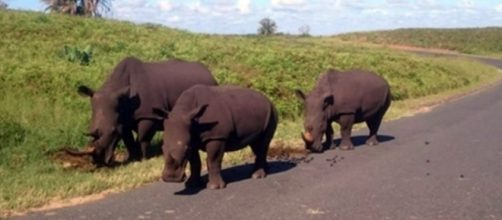A beloved rhino family in the iSimangaliso World Heritage Site, which was previously known as the Greater St Lucie Wetland Park, has been wiped out for their horns.
The Heritage site is 3,280 km2 of natural ecosystems and includes an amalgamation of 16 preserves. Popular for its beauty and biodiversity, South Africans were shocked to find out that the rhino family they knew as well as tourists knew Cecil the lion in Zimbabwe, had been shot and their horns stolen.
Mother Rhino, known as Mrs. Longhorn and her two calves were discovered shot to death last Thursday.
This is the first poaching incident of rhino in the ten years that rhino have lived in the reserve.
iSimangaliso CEO Andrew Zaloumi spoke to the Zululand Observer about the incident. ““It is emotionally wrenching to have witnessed the murder and butchering of such a magnificent rhino,” he said.
Thousands of visitors knew the rhinos and her gentle nature meant that the family could be viewed in their natural habitat without stressing her, or the visitors to the park.
The tragedy of the death of the family is that Mrs. Longhornsurvived one if the worst droughts in this century, and now has been killed so someone in the world can use her horn as a medication that does nothing for humans.
SA People quoted a post by South African Craig Munro, on Facebook. He speaks for all South Africans, when he posted, “How dare they come here to kill our wildlife to feed their incorrect beliefs.”
Extreme emotions have been aroused by this, with comments ranging from calls for Nationals who come from countries who use rhino horn to be banned from visiting South Africa, to a suspicion that Parks officials were negligent.
Some comments to the media stories include anger that everyone “knows the dangers” so why were these rhino not closely protected?” The simple answer is that it costs a huge amount of manpower and money to have a one on one, round the clock protection team in place. The bottom line is that the rangers in these areas are there to protect the entire ecosystem, not just the rhinos.
Anger at the parks officers might be related to the tragic and incredible news that in Zimbabwe police and parks officials were involved in poaching and poisoning of elephants. In 2014, South African National Parks arrested an ex-ranger for poaching. The growing anger against the Asian nations who devastate our wildlife is most certainly not misplaced either.
Frustration, pain, anger, outrage is on the rise and justifiably so. Will the madness only end when the last of the rhinos are dead?

